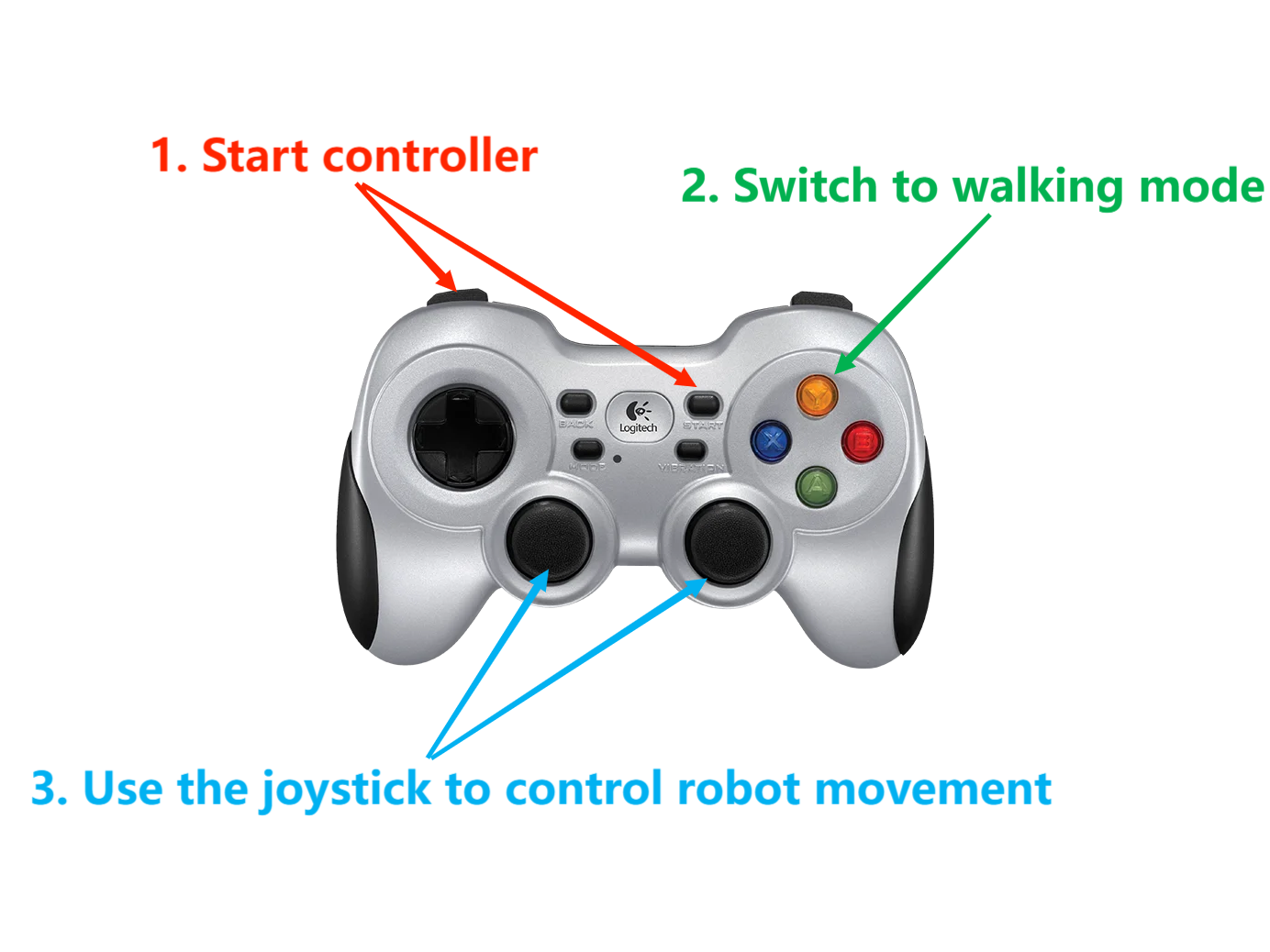An open source bipedal robot control framework, based on non-linear MPC and WBC, tailered for EC-hunter80-v01 bipedal robot. For more information refer to the project's Page.
More detailed hardware information about hunter and bipedal robot communication group
# Clone
mkdir -p <catkin_ws_name>/src
cd <catkin_ws_name>/src
git clone https://github.com/bridgedp/hunter_bipedal_control.git
# Build
cd <catkin_ws_name>
catkin init
catkin config -DCMAKE_BUILD_TYPE=RelWithDebInfo
catkin build- Run the gazebo simulation and load the controller:
roslaunch legged_controllers one_start_gazebo.launch- Run the mujoco simulation and load the controller:
roslaunch legged_controllers one_start_mujoco.launch- load the controller
roslaunch legged_controllers one_start_real.launchNotes:
After the user starts the simulation, the robot falls down in Gazebo OR Mujoco.
-
Gazebo First the user needs to set kp_position=100, kd_position=3 in rqt (need refresh) and reset the simulation by pressing Ctrl+Shift+R to make the robot stand up.
-
Mujoco First the user needs to set kp_position=100, kd_position=3 in rqt (need refresh) and reset the simulation by clicking Reload to make the robot stand up.
Then, send the following commands:
rostopic pub --once /reset_estimation std_msgs/Float32 "data: 1.23"This command will reset the state estimation information because Reload brings mutation effects to the state estimation.
- Start controller
L1 + start
- Switch to walking mode
Y
- Use the joystick to control robot movement
The following is a schematic diagram of the handle operation:
Compilation: Only compile the following packages (and their dependencies), there's no need to compile the entire OCS2.
- Gazebo Simulation
catkin build legged_controllers legged_hunter_description legged_gazeboExecution: If you don't have a gamepad, you need to send the startup commands in order.
First, set kp_position=100 in rqt and reset the simulation by pressing Ctrl+Shift+R to make the robot stand up. Then, send the following commands:
rostopic pub --once /load_controller std_msgs/Float32 "data: 1.23"
rostopic pub --once /set_walk std_msgs/Float32 "data: 1.23"Before /load_controller, there needs to be a node continuously sending /cmd_vel (10Hz is normal), and it should continue sending during the simulation. Once /cmd_vel stops, the robot may fall.
As a example, here's a Python script that continuously sends /cmd_vel and allows keyboard control. You should start the script before /load_controller.
#!/usr/bin/env python
import rospy
from geometry_msgs.msg import Twist
from pynput import keyboard
import threading
class KeyboardController:
def __init__(self):
self.publisher = rospy.Publisher('/cmd_vel', Twist, queue_size=1)
self.twist_msg = Twist()
self.rate = rospy.Rate(10)
def on_press(self, key):
try:
if key.char == 'q':
rospy.signal_shutdown("Quit")
else:
if key.char == 'w':
self.twist_msg.linear.x = 0.35
elif key.char == 's':
self.twist_msg.linear.x = -0.35
else:
self.twist_msg.linear.x = 0.0
if key.char == 'a':
self.twist_msg.angular.z = 0.35
elif key.char == 'd':
self.twist_msg.angular.z = -0.35
else:
self.twist_msg.angular.z = 0.0
except AttributeError:
pass
def on_release(self, key):
self.twist_msg.linear.x = 0.0
self.twist_msg.angular.z = 0.0
def ros_publish():
while not rospy.is_shutdown():
controller.publisher.publish(controller.twist_msg)
controller.rate.sleep()
if __name__ == '__main__':
rospy.init_node("keyboard_control")
controller = KeyboardController()
thread = threading.Thread(target=ros_publish)
thread.start()
listener = keyboard.Listener(on_press=controller.on_press, on_release=controller.on_release)
listener.start()
while not rospy.is_shutdown():
pass
listener.stop()
listener.join()
thread.join()- Mujoco Simulation
catkin build legged_controllers legged_hunter_description legged_mujoco lcm_msg mujocoExecution: If you don't have a gamepad, you need to send the startup commands in order.
First, set kp_position=100 kd_position=3 in rqt and reset the simulation by clicking Reload to make the robot stand up. Then, send the following commands:
rostopic pub --once /reset_estimation std_msgs/Float32 "data: 1.23"
rostopic pub --once /load_controller std_msgs/Float32 "data: 1.23"
rostopic pub --once /set_walk std_msgs/Float32 "data: 1.23"and
rosrun rqt_robot_steering rqt_robot_steering -
Plug a monitor into the onboard mini pc. Login to a local network and double check the computer name and user name.
-
Power the mini PC from the onboard battery it should automatically connect to the local network.
-
Open a terminal, power shell, or any ternimal emulator (PuTTY) from another PC on the same network.
ssh <username@hostname>cd Desktop/hunter_bipedal_control/
sudo su
source devel/setup.bash
roslaunch legged_controllers one_start_real.launch rviz:=false-
Hold L1 and slowly push L2 to the end to increase kp_position.
-
The rest of the steps are the same as controlling in simulation.
https://github.com/qiayuanl/legged_control
[1] Flayols T, Del Prete A, Wensing P, et al. Experimental evaluation of simple estimators for humanoid robots[C]//2017 IEEE-RAS 17th International Conference on Humanoid Robotics (Humanoids). IEEE, 2017: 889-895.
[2] Bloesch M, Hutter M, Hoepflinger M A, et al. State estimation for legged robots-consistent fusion of leg kinematics and IMU[J]. Robotics, 2013, 17: 17-24.
[3] Di Carlo J, Wensing P M, Katz B, et al. Dynamic locomotion in the mit cheetah 3 through convex model-predictive control[C]//2018 IEEE/RSJ international conference on intelligent robots and systems (IROS). IEEE, 2018: 1-9.
[4] Grandia R, Jenelten F, Yang S, et al. Perceptive Locomotion Through Nonlinear Model-Predictive Control[J]. IEEE Transactions on Robotics, 2023.
[5] Sleiman J P, Farshidian F, Minniti M V, et al. A unified mpc framework for whole-body dynamic locomotion and manipulation[J]. IEEE Robotics and Automation Letters, 2021, 6(3): 4688-4695.
[6] Bellicoso C D, Gehring C, Hwangbo J, et al. Perception-less terrain adaptation through whole body control and hierarchical optimization[C]//2016 IEEE-RAS 16th International Conference on Humanoid Robots (Humanoids). IEEE, 2016: 558-564.
[7] Kim D, Di Carlo J, Katz B, et al. Highly dynamic quadruped locomotion via whole-body impulse control and model predictive control[J]. arXiv preprint arXiv:1909.06586, 2019.

